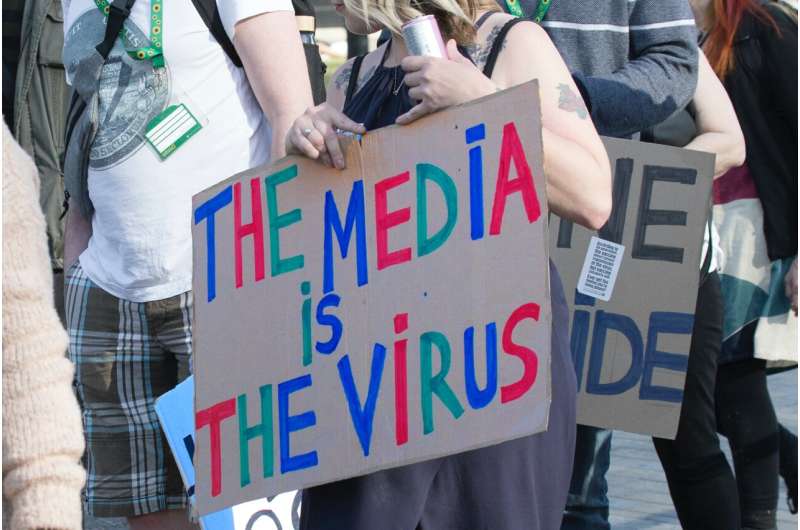
Vaccine passports have become a major point of contention in the 2021 federal election.
Currently, more than 73 percent of Canada’s population have received at least one dose of vaccine, and the country’s response to COVID-19 continues to be a top priority for voters. This is likely why current public health efforts have concentrated on expanding vaccine access and implementing communication strategies (like motivational interviewing) to increase vaccination rates.
But, as seen through recent anti-vax protests, especially those targeting schools and hospitals, there is a worrisome convergence of the anti-vaccine movement and far-right political extremism.
And on the frontline of these anti-vax protests are people occupied by extreme rage who are threatening to exert violence against whoever they deem as “outsiders” and “traitors.”
For decades, vaccine hesitancy has been a subject of intense study in the field of scientific communication. The issue’s recent radicalization makes insights about its root causes even more important.
Factors contributing to vaccine hesitancy
A distinction must be drawn between vaccine hesitancy and the current anti-vax movement, as the latter’s agenda has been hijacked by far-right groups.
Previous study has identified a variety of factors contributing to people’s vaccination hesitancy, such as community trauma, scientific skepticism and political beliefs. Some Indigenous communities’ concerns about COVID-19 vaccines, for instance, come from instances of medical experimentation.
Meanwhile, errors made during pro-vaccine communications may raise additional concerns about vaccination safety and efficacy. Consider the public uncertainty and outrage over the National Advisory Committee on Immunization’s contradictory messages regarding AstraZeneca.
Research on vaccine hesitancy around the world has demonstrated that a number of contributing factors to vaccine hesitation are directly linked to a persistent decline in public trust in institutions and government policy. In recent years, this trend, along with escalating political polarization, has shaped the anti-vaccine movement into its current form.
Prior to the pandemic, researchers noted that social media platforms, like Facebook, facilitate anti-vaccine messages and conspiracy theories by enabling the diffusion of misinformation like “pesticides caused clinical symptoms of polio.” Fast forwarding to 2020, major anti-vaccine groups on Facebook launched anti-vaccine misinformation campaigns weeks before the U.S. government launched its vaccine development program, sewing seeds of doubt and subsequently hampering the rollout of COVID-19 vaccines across the country.
The radicalization of the anti-vaccine movement
Since the start of mass COVID-19 vaccinations in early 2020, the public health sector has been closely monitoring an unusually high level of resistance among a small section of the population. Unlike prior vaccination hesitancy, the current anti-vax movement cannot be explained by a lack of information or illogical thinking, especially in light of the significant press coverage and public health initiatives over the last several months.
Scholars have resorted to the solution aversion model to account for the growing political division around vaccination. According to this model, individuals with divergent political ideologies perceive social issues differently because of their inherent aversion to specific solutions. In the case of vaccine passports, its implementation depends on stringent government regulations, which are deeply unpopular among many far-right individuals.
Additionally, our fragmented media environment further fosters solution aversion by promoting motivated reasoning. With today’s media audiences being trapped in algorithm-based digital echo chambers, it is increasingly typical for individuals to interact exclusively with like-minded media sources and other internet users, resulting in biased information absorption.
Fixing the broken public sphere
Admittedly, reconciling the divided public opinions on COVID-19 vaccination policies is not a simple task. As long as social media platforms continue to not bat an eye at misinformation out of concern for their click-through rates, and governments continue to ignore structural injustices driving political radicalization, it is unlikely that vaccine resistance will be reduced without increasing polarization.
Source: Read Full Article
